|
Nukaga: Japan must study attack capability
July 11, 2006
Yomiuri Shimbun (Japan)
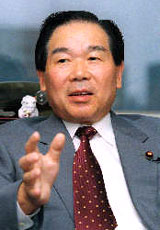 Defense Agency Director General Fukushiro Nukaga said Sunday Japan needs to consider the possibility of becoming capable of attacking enemy bases following North Korea's ballistic missile launches.
Defense Agency Director General Fukushiro Nukaga said Sunday Japan needs to consider the possibility of becoming capable of attacking enemy bases following North Korea's ballistic missile launches.
"As a sovereign nation, even if we have a framework that keeps us from launching a war of aggression or using force in foreign countries, we must possess minimal capabilities to protect the people," Nukaga told reporters in Tokyo. "The ruling bloc should discuss the matter."
He added, "It's not that [the government would] do anything in haste."
Nukaga also referred to the issue on a Fuji TV program. "I think the prime minister and we [the government] can decide what we should do to protect Japan when we're certain an enemy is targeting the country with the means to attack, such as putting a finger on a gun's trigger," he said. "However, it's now a matter of whether we possess the capabilities to attack."
|
|
This news reported that the Defense Agency Director General NUKAGA Fukushirō (額賀福志郎) said Japan should consider acquiring the "capability to attack enemy missile bases" following North Korea's missile launches to the Sea of Japan on July 5, 2006. After this news was reported, China implied its "opinion" in the foreign ministry spokeswoman's press conference.
|
China restrains Japan's possible attack capability
July 11, 2006, 9:01PM JST
Jiji News (Japan)
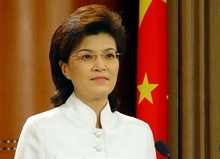 Beijing (Jiji News) — Regarding to Japan's government official's words that Japan needs to consider the possibility of becoming capable of attacking enemy bases, China's Foreign Ministry spokeswoman Jiang Yu (姜瑜, picture) commented in her press conference on July 11.
Beijing (Jiji News) — Regarding to Japan's government official's words that Japan needs to consider the possibility of becoming capable of attacking enemy bases, China's Foreign Ministry spokeswoman Jiang Yu (姜瑜, picture) commented in her press conference on July 11.
"We oppose to any draft escalating the tensions. All China has done is to safeguard peace and stability of Peninsula and the region, safeguard the solidarity of Security Council and safeguard the process of Six-Party Talks,"[*1] she restrained discussions in Japan.
(originally written in Japanese)
|
|
Well, China is not eligible to say anything on this matter however.
First of all, China disposes nuclear missiles such as "Dongfeng 21" (東風21 / NATO code name:CSS-5) in its domestic base in Tonghua (通化), Jilin Province (吉林省) aiming at major cities of Japan such as Tokyo and military bases of the Japan Self Defense Forces and the US Army. It is the evidence that China clearly regards Japan as its "enemy" and it indicates that China has a capability to attack strategic bases in Japan ("enemy's bases" from China's view) for any disputes between Japan and China or the US and China. (Details are mentioned in my previous essay No. 114. (China's nuclear missiles aiming at its "most supporting country" Japan)
Japan currently does not equip any aircraft carriers and missiles that are indispensable for attacking remote targets. It means if a war occurs between Japan and China or Japan and North Korea, Japan is not capable to have decisive attacks. In this condition, it is definitely impossible to have any "Japan's military aggressions" that China and Koreas repeatedly say. The reason why China criticizes Japan regarding this matter must be something else.
China already has an absolute advantage against Japan in terms of its military capability that equips nuclear weapons. Consequently, diplomatically and politically, China has a lead in the region. It is quite common knowledge that China aims to hold supremacy in East Asia so China is displeased if Japan gains power to block its aspiration. China does not want to accept Japan to have a capability to attack enemy bases that China already has. But the time has changed after 60 years from the war, and now Japanese people are not obedient sheep for China any longer.
The voting results of an internet survey, "Do you think that Japan needs to have a capability of attacking enemy's bases" by Yahoo! Japan shows an interesting result. The 80 % of the total vote cast was "Yes." The result indicates that Japanese people have been woken up by North Korea's missile launch.
The Article 9 of the Constitution of Japan has become almost like a religion for believers after the World War II. But people have realized that its principle, "To maintain pacifism contributes for the stability and peace of all over the world" is nominal before military threats of one-party dictatorships. The result of the survey shows that people's awareness has risen that we have to protect our country and people by ourselves and we should have a capability of attacking enemy bases as our insurance regardless to actually exercise it or not. That every person has the awareness is a rather normal condition than just dreaming eternal peace.
In that sense, we would appreciate North Korea that launched seven missile in a day. China obviously obstructed the UN resolution imposing sanctions on North Korea by threatening to veto in the Security Council to force to change to a resolution only condemning North Korea. Thank North Korea and China to confess the real mind.
Although Japan is surrounded by enemy countries, there is a friendly neighbor of us.
President Chen Meets with Japan Parliamentarian Hagiuda Koichi
July 11, 2006
News Releases
Office of the President, Republic of China (Taiwan)
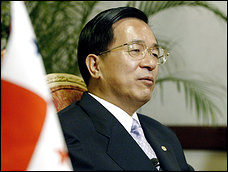 President Chen Shui-bian President Chen Shui-bian |
President Chen Shui-bian (Chen Sui-pien ; 陳水扁) met with Japan's Parliamentarian Hagiuda Koichi (萩生田光一) on July 11 at the Office of the President.
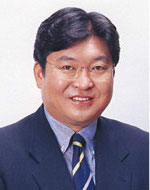 Hagiuda Kôichi Hagiuda Kôichi |
The president particularly mentioned to Koichi his concern over the recent North Korean missile test. "My administration expressed immediate condemnation of North Korea for its missile test, which truly was a provocative act that has threatened the peace and stability on the Korean Peninsula and in the Asian Pacific region," he said.
"Taiwan also faced China's missile threat when the first direct presidential election was held on the island in 1996," the president said. "Hence Taiwan fully supports the inclusion of Taiwan Strait issues into the strategic objectives targeted by the US-Japan Security Consultative Committee."
The president also thanked Japan for supporting Taiwan's bid to participate as an observer in the World Health Assembly, and for granting Taiwan's travelers to Japan permanent visa-free privileges.
As Kaohsiung City (高雄) of Taiwan and Hachioji City (八王子) of Japan are sister cities, through this relationship the president and his guest both looked forward to stronger cooperation between Taiwan and Japan.
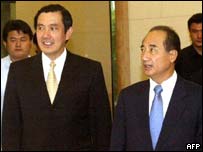 Ma Ying-jeou (left) Ma Ying-jeou (left)
Wang Jing-ping (right) |
The president also expressed his best wishes to Kuomintang (KMT) Chairman Ma Ying-jeou (馬英九), who currently is visiting Japan.
Hagiuda Koichi's visit to the Office of the President was accompanied by Taiwan's Vice Minister of Foreign Affairs Chang Siao-yue. Secretary-General to the President Mark Chen and Senior Advisor Lin Chen-wei of the National Security Council were also present in the meeting.
|
|
President Chen Sui-pien's words tells that we are sharing this situation under the threats of military power by scoundrel nations.
Japan's reaction against North Korea's missile launches (not only this, there have been other reasons such as abductions, illicit sales of drags and gorged money), or China's action which launches missiles to threaten Taiwan, which one is more justifiable?
One thing has been made clear by this problem that it is absolutely impossible to have good relationships with both of China and North Korea. As Japanese people have been woken up by North Korea's missiles, I am expecting that people will pay more attention on Taiwan that it is a very important strategic partner besides the United States to protect our country.
Reference for English translation
*1. Foreign Ministry Spokeswoman Jiangyu's Regular Press Conference on 11 July 2006. Ministry of Foreign Affairs of the People's Republic of China.
http://www.fmprc.gov.cn/eng/xwfw/s2510/t262715.htm
 Defense Agency Director General Fukushiro Nukaga said Sunday Japan needs to consider the possibility of becoming capable of attacking enemy bases following North Korea's ballistic missile launches.
Defense Agency Director General Fukushiro Nukaga said Sunday Japan needs to consider the possibility of becoming capable of attacking enemy bases following North Korea's ballistic missile launches. Beijing (Jiji News) — Regarding to Japan's government official's words that Japan needs to consider the possibility of becoming capable of attacking enemy bases, China's Foreign Ministry spokeswoman Jiang Yu (姜瑜, picture) commented in her press conference on July 11.
Beijing (Jiji News) — Regarding to Japan's government official's words that Japan needs to consider the possibility of becoming capable of attacking enemy bases, China's Foreign Ministry spokeswoman Jiang Yu (姜瑜, picture) commented in her press conference on July 11.

